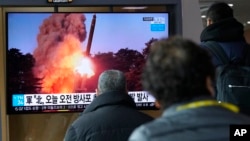North Korea has conducted a missile launch, apparently using a multiple rocket launch system, South Korea’s military said Sunday, the latest in a frenzy of North Korean missile tests.
The statement from the South Korean military did not specify the range, direction, or exact type of weapons launched, but said the military is closely monitoring the situation.
South Korea’s Yonhap news agency reported North Korea fired four rockets over the span of an hour from South Pyongan province into the sea off the country’s west coast.
Seoul’s National Security Council held an emergency meeting to discuss the launch, the report added.
So far this year, North Korea has conducted 11 rounds of launches, as it systematically works through a wish list of strategic weapons laid out last year by North Korean leader Kim Jong Un.
Last week, a failed North Korean missile launch resulted in a mid-air explosion that reportedly rained debris near Pyongyang. North Korea has stayed silent about that incident. The launch appears to have been particularly reckless, since it occurred at North Korea’s main international airport.
U.S. officials have warned North Korea could soon test a new intercontinental ballistic missile, possibly under the guise of a satellite launch.
A multiple rocket launch system test would likely be seen as less provocative than a long-range missile launch, but analysts warn that this kind of weapon still poses a major threat to South Korea.
North Korea in 2019 repeatedly tested a new super-large-caliber multiple rocket launcher, which U.S. officials labeled KN-25.
The KN-25, which fires rockets from a four-tube mobile launcher, “blurs the distinction between multiple-launch rocket systems (MLRS) and short-range ballistic missiles,” according to the CSIS Missile Defense Project, a project of the Center for Strategic and International Studies in Washington.
Many analysts consider the KN-25 to be a “ballistic missile” system, because it fires such large weapons.
By repeatedly testing the KN-25, defense analysts say North Korea has successfully reduced the amount of time it takes to launch successive rockets from the system, making it more likely to survive a conflict.




